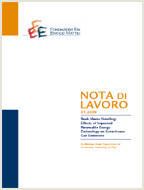Fossil Fuel Extraction and Climate Policy: A Review of the Green Paradox with Endogenous Resource Exploration

01.03.2012
Ines Österle
Q31, Q54, Q58, H23, H32
Green Paradox, Supply-side dynamics, Climate Policy, Exhaustible Resources, Fossil Fuels, Exploration, Carbon Taxes
Climate Change and Sustainable Development
Carlo Carraro
Policies aimed at reducing emissions from fossil fuels may increase climate damages. This "Green Paradox" emerges if resource owners increase near-term extraction in fear of stricter future policy measures. Hans-Werner Sinn (2008) showed that the paradox occurs when increasing resource taxes are applied within a basic exhaustible resource model. This article highlights that the emergence of the Green Paradox within this framework relies on the non-existence of a backstop technology and fixed fossil fuel resources. In doing this, it initially presents a basic exhaustible resource model which includes a backstop technology and shows that the implementation of a specific sales tax path is effective in mitigating global warming. Secondly, it considers the case of costly exploration activities being introduced within the basic model and accounts for the real world condition that the location of fossil fuels is unknown. Under this condition, an increasing cash flow tax is effective in dealing with climate change if policy makers commit to a high initial tax level and to a specific range of growth rates.
